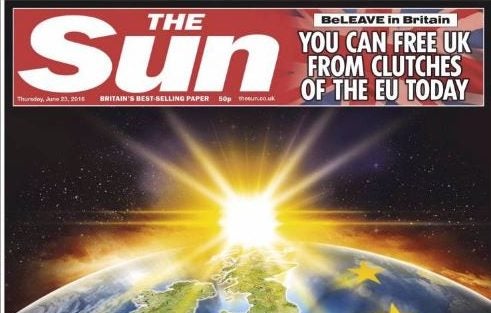
National newspapers and websites have reported a boost in readership since Friday as readers have tried to make sense of Britain’s vote to leave the EU.
The Evening Standard hit more than 1m circulation on Friday (ahead of its normal free distribution figure of 900,000) as readers picked up extra copies.
The Saturday edition of The Times was said to be up by 100,000 copies (18 per cent week on week), the Daily Mail was believed to be up 90,000 that day and the Daily Mirror up 40,000.
The i reported a record circulation on Saturday of 310,000, up 24 per cent on year.
The Financial Times reported new subscriptions up 600 per cent in the days following Brexit (compared to a normal weekend). It now claims a record 800,000 paid subscribers.
Strong demand for Brexit vote coverage topped a record month for the New Statesman which said it reached a record 4m unique browsers in June and 25m page views.
Political website Guido Fawkes said it has been running at 200,000 to 250,000 “hits” per day, up from around 120,000 to 150,000 normally.
Telegraph.co.uk said it reached a record 16.3m global unique users on Friday, 24 June, compared with its normal daily average of 4.3m.
The Guardian also had its biggest ever day with 17m unique users (compared with its usual daily average of 8.9m).
Mirror Online reached 5.3m unique visitors on Friday, compared with its normal average of 4.6m
According to Mail Online, Friday was the site’s biggest ever day in terms of readers arriving directly to the home page.
A spokesperson said: “We’ve had slightly bigger days overall but easily our biggest day for direct homepage and app traffic – over 6m destination visitors, up over 30 per cent on normal (not including Snapchat) and has stayed significantly higher ever since.”
John Witherow, editor of The Times, said: “People turn to The Times at moments of great national significance because they trust our ability to contextualise the news and value our balanced insight and analysis on what has happened, and what may happen next.”
Chris Duncan, chief customer officer of News UK, said the increase in circulation for its titles was “a clear demonstration of how print plays a role in both the campaign and in helping our readers understand the impact of the vote”.
Trade body the News Media Association said the EU referendum was evidence of the influence national newspapers still have.
Overall, the UK national newspaper market strongly backed a vote in favour of leaving the European Union.
Ian Whittaker, head of European media research at Liberum, said: “The EU Referendum should be positive for newspapers as businesses.
“In the short-term, it will have helped to boost circulation revenues given the huge public demand for in-depth news and analysis of the Brexit vote and its consequences; and in the medium to long-term, it will be taken as a demonstration of how much influence newspapers still have, which is a persuasive argument to use with advertisers.
“Media agencies already recognise that newspapers offer greater engagement with their readers than any other form of media.The result of the Brexit vote is likely to reinforce that perception as well as the view that the press can reach viewers in a way that social media and digital cannot. In that regard, it may persuade advertisers that print has more value than realised, especially given the questions being raised about online media at the moment.”
Email pged@pressgazette.co.uk to point out mistakes, provide story tips or send in a letter for publication on our "Letters Page" blog
